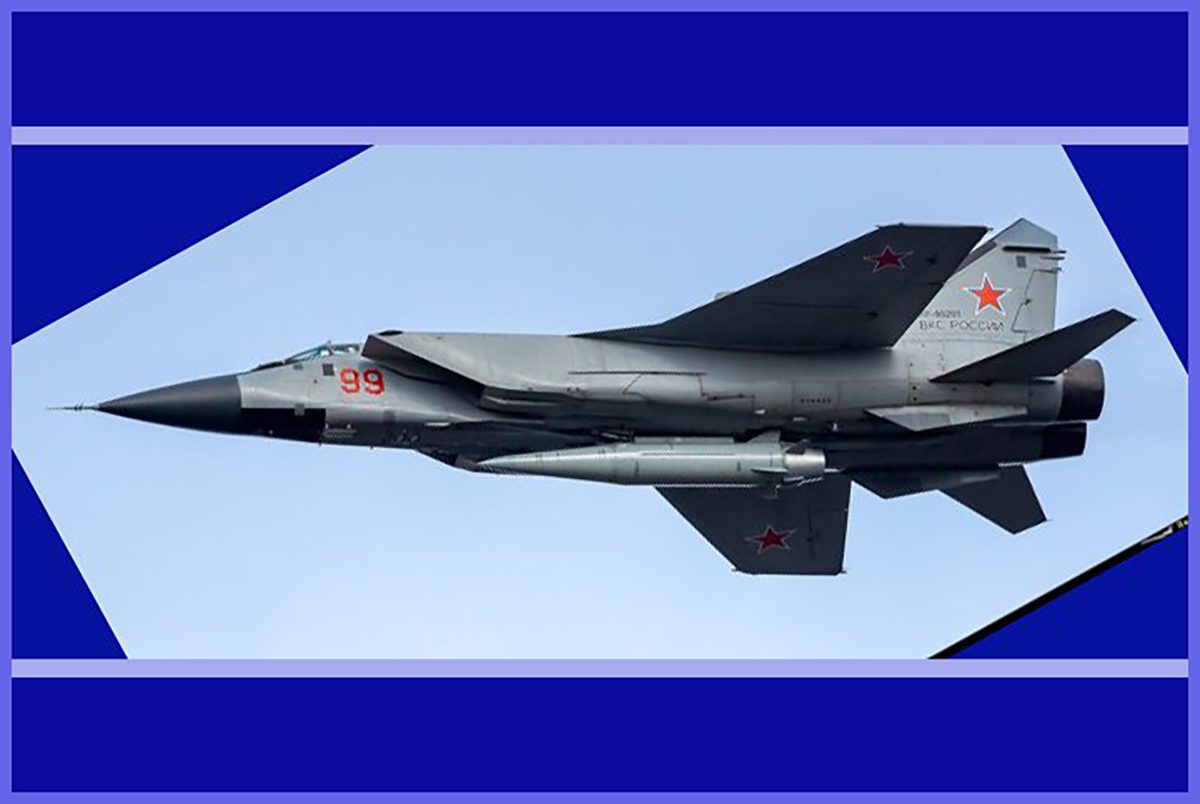With its cutting-edge technology and unparalleled speed, the Kinzhal Missile, known by its NATO Reporting Name “Killjoy,” is a nuclear-capable hypersonic air-launched ballistic missile (ALBM), standing as a testament to Russian innovation and military prowess. The word “Kinzhal,” which means “dagger,” is sufficient to help us understand that once the missile is launched at a speed exceeding Mach 10, there will be no way to escape its determined trajectory. And if, by chance, it carries a nuclear warhead, vaporization will become an inevitable reality, representing the harrowing truth of potential mass destruction.
The Kh-47M2 Kinzhal Missile is part of a series of new Russian strategic armaments unveiled by President Vladimir Putin in March 2018. This advanced weapon system became operational in December 2017 and is intended for deployment on MiG-31K interceptors as well as Tu-22M3 bombers. It possesses the capability to transport both conventional and nuclear payloads. Presently, this missile system has been strategically positioned at air bases within the Western and Southern Military Districts of Russia.
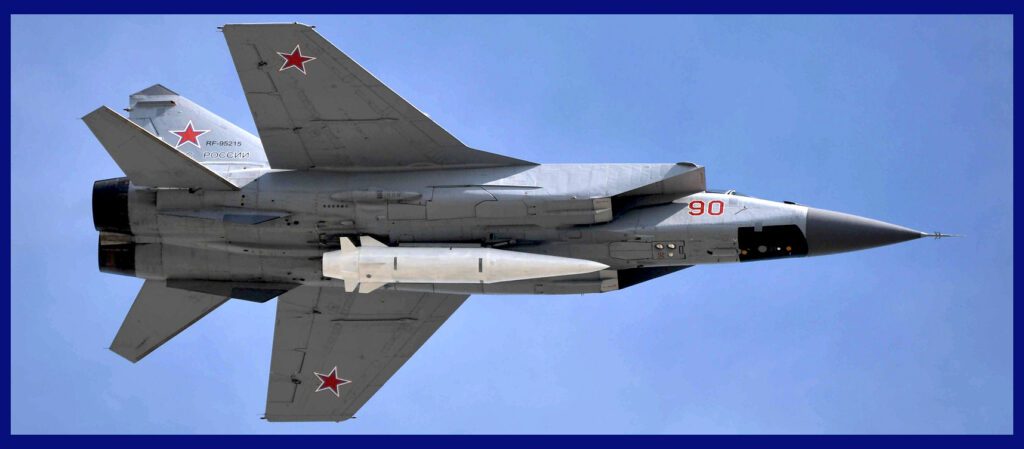
Development of the Kh-47M2 Kinzhal ALBM
Although it is unknown when Kinzhal’s development got started, concept images of Russian Iskander missiles mounted on the MiG-31 fighter started appearing online in about 2010. These images allegedly came from a Russian defence company’s prospectus brochure.
Analysts believe that this short-range ballistic missile is most likely based on the ground-launched Iskander-M short-range ballistic missile due to these concept designs, as well as the missile’s capabilities and basic appearance. The advantages of developing an air-launch variant over ground-based Iskander missiles are increased range, deployability, and flexibility.
It is probable that Russia created this distinct missile to enhance its capability in aiming at important infrastructure in Europe, like airfields, warehouses, and command centres. This development might also be intended to counter the U.S. missile defence system known as THAAD. The missile’s capacity to be launched from unpredictable angles could challenge radars with limited coverage, such as the ones used by the Patriot system. Moreover, if the Kinzhal indeed possesses the ability to target ships, it could potentially endanger U.S. and NATO aircraft carriers.
Design Features of the Kh-47M2 Kinzhal ALBM
According to one report, Kinzhal’s measurements are identical to those of the OTK 9M723 Iskander-M. Its length is 8 meters, its body diameter is 1 meter, and its launch weight is roughly 4,300 kilograms. However, there are some important differences between it and the ground-based Iskander, such as a revised tail section, fewer rudders, and a unique stub at the missile’s tail intended to shield engine nozzles during high-speed combat.
The missile is intended to attack NATO missile defence systems, ballistic missile defence ships, and land targets near Russian borders as well as NATO warships that pose a danger to strategic missile systems in European Russia. Any existing or future NATO air or missile defence systems, such as the MIM-104 Patriot, Terminal High Altitude Area Defense ( THAAD ), and Aegis Combat System ( ACS ), are purportedly designed to be defeated by Kinzhal.
It employs conventional ballistic missile technology at higher speeds as opposed to the more current hypersonic glide and scramjet missile technologies. The missile’s overall design is similar to the 9K720 Iskander, a surface-to-surface missile, however, the guidance system has been altered for Kinzhal. According to reports, it can strike both stationary targets and moving ones, including aircraft carriers.
The Kinzhal missile stands out with its exceptional speed, making it more effective at penetrating targets compared to lighter and slower cruise missiles like Storm Shadow or Taurus. Referred to by some sources as the “carrier killer,” it earns this name due to its hypersonic velocity, exceptional accuracy, and advanced manoeuvring capabilities. This moniker stems from its reported capability to incapacitate and potentially sink a supercarrier weighing 100,000 tons with just one strike. The Kinzhal carries a kinetic energy of over 16.9 gigajoules, equivalent to 4,000 tonnes of TNT, upon impact at a Mach 10 speed, with a total mass of 2,000 kg (4,400 lb) and includes a 500 kg warhead.
According to Russian media, when the combat radius of the aircraft is taken into account, the missile’s range is 2,000 km ( 1,200 mi ) when carried by the MiG-31K interceptor and 3,000 km ( 1,900 km ) when carried by the Tu-22M3 bomber.
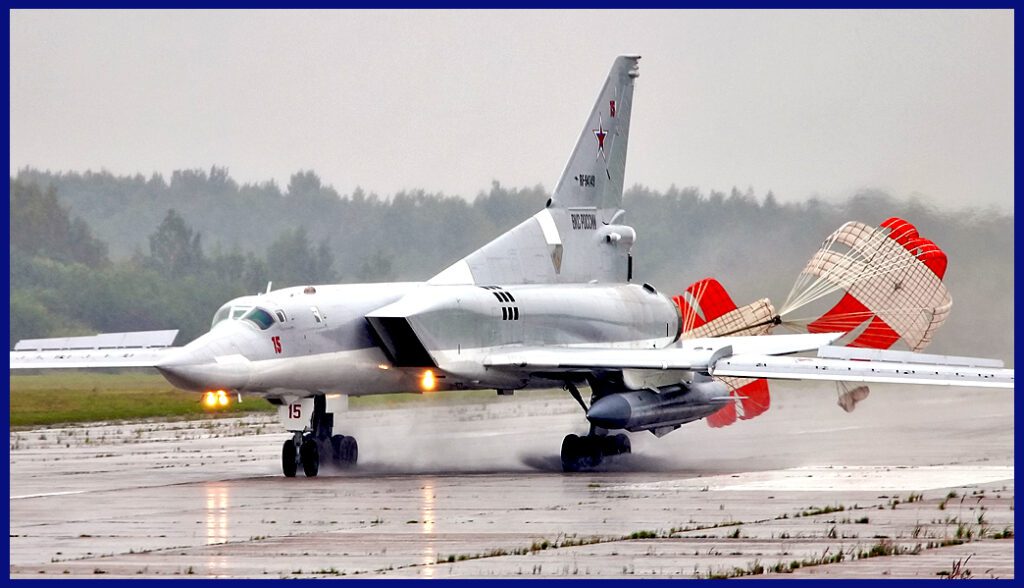
The Operational Background of the Kinzhal Missile
After the introduction of the missile by Russian President Vladimir Putin in March 2018, Ten MiG-31K aircraft that can launch Kinzhal missiles were assigned and were on experimental combat duty when called upon. By December 2018, 89 sorties over the Black Sea and the Caspian Sea had been completed by aircraft carrying Kinzhal missiles.
The MiG-31K Kinzhal missile carrier crews had flown over 380 training flights with the missile by the end of February 2019, at least 70 of which had involved air-to-air refuelling. When the Aviadarts international competition took place in August 2019, the weapon had its public premiere.
Mid-November 2019 saw the inaugural launch of the Kinzhal missile in the Arctic, according to the Russian news agency TASS. This launch was allegedly conducted using an Olenya air base-based MiG-31K aircraft. At a remarkable Mach 10 speed, the missile accurately struck a terrestrial target at the “Pemboy” testing range.
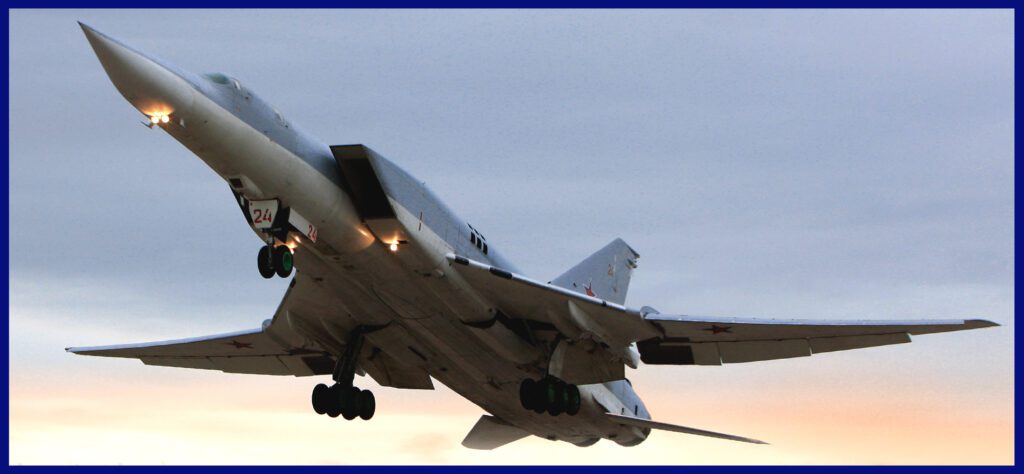
In June 2021, a MiG-31K aircraft launched a Kinzhal missile from Khmeimim Air Base, directing it towards a terrestrial target located in Syria. Subsequent to this event, in 2021, a unique aviation regiment was established featuring MiG-31K aircraft armed with the Kinzhal hypersonic weapon. These developments were reported by TASS.
Amid the 2022 Russian intervention in Ukraine, the Russian military stated that Kinzhal missiles were employed to eliminate an asserted subterranean weapons storage of the Ukrainian armed forces in Deliatyn on 18 March 2022, followed by targeting fuel storage in Konstantinovka the subsequent day.
Evidently, there was another instance of its use on April 11. Subsequently, on May 9, a Russian Tu-22M3 bomber discharged three missiles resembling Kinzhal against targets in the port city of Odesa. Notably, a significant barrage of 84 missiles, which included six Kinzhals, was initiated on March 9, 2023, targeting Ukrainian cities, marking a notable escalation. Ukraine lacks effective countermeasures against Kinzhals, and it remains uncertain whether the Patriot missile defence system possesses the capability to intercept such rockets.
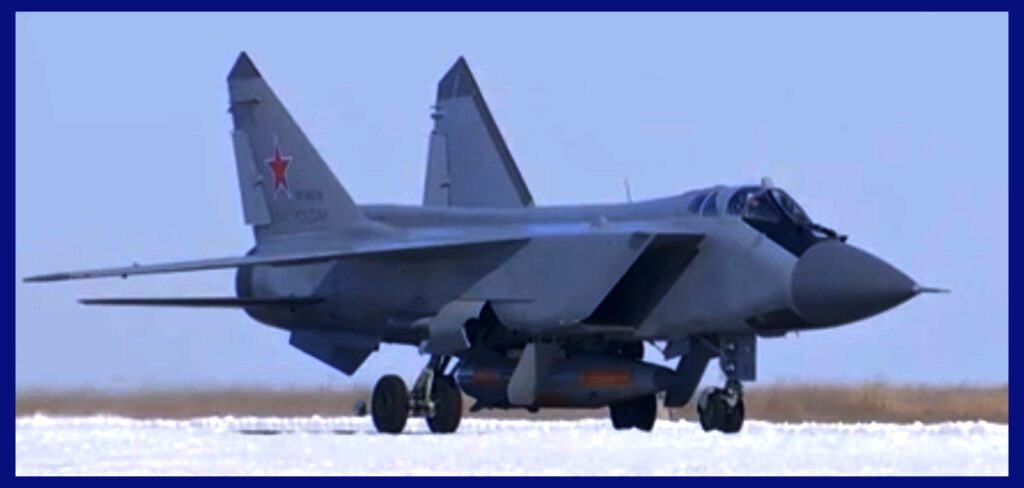
Kh-47M2 Kinzhal ALBM Specifications
- Weight: 4,300 kg ( 9,500 lb )
- Length: 23 ft 7 in ( 7.2 m )
- Diameter: 47 in ( 1200 mm )
- Wingspan: 5ft 3 in ( 1.6 m )
- Warhead: Conventional & Low yield nuclear warhead weighing approx 500 kg
- Detonation: Impact Fuse
- Engine: Solid propellant rocket
- Range: 2000 km ( when carried by the MiG-31K ) & 3000 km ( when carried by the TU-22M3 )
- Speed: Mach 10
- Guidance: Intertial Guidance, Mid-course update data link
- Launch Platform: MiG-31K & TU-22M3
Furthermore, seize this exclusive opportunity to acquire the exquisite large-scale 1/72 premium die-cast models of the formidable MIG-25PD “Foxbat.” These remarkable and iconic military jets, widely acclaimed as the epitome of the fastest interceptor with an impeccable track record, are presently available for purchase on AirModels, offering worldwide delivery. Don’t let this chance slip by to own these exceptional and meticulously crafted models that flawlessly encapsulate the essence of aviation history. Click here now to secure your piece before the limited stock is depleted.
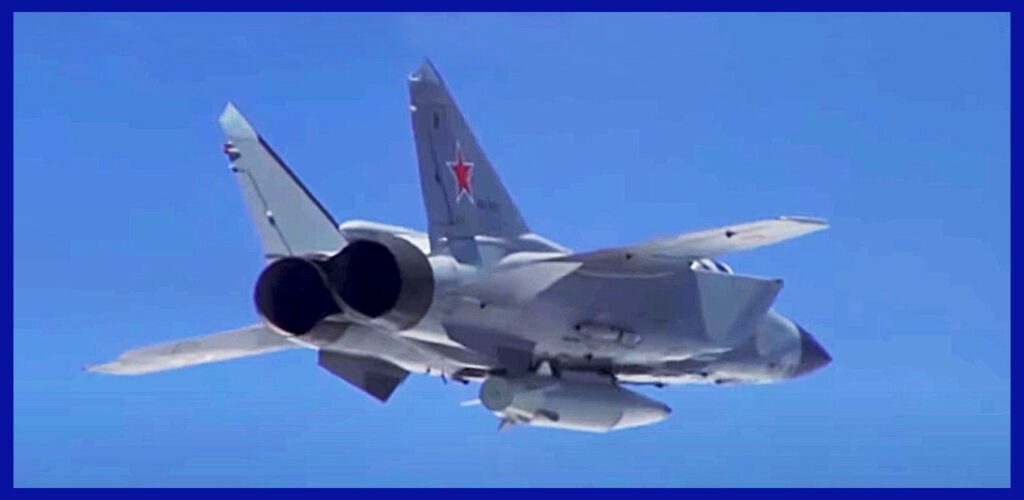
In conclusion, the Kh-47M2 Kinzhal represents a significant advancement in Russia’s military capabilities, showcasing cutting-edge technology and innovation in the field of air-launched ballistic missiles. With reported high speeds, impressive manoeuvrability, and a range that allows it to engage targets at considerable distances, the Kinzhal missile has the potential to be a game-changer in modern warfare scenarios.
Its air-launched nature, carried by the modified MiG-31K interceptor aircraft, provides tactical flexibility and rapid response capabilities for engaging a variety of targets, from naval vessels to ground installations. The missile’s exact specifications and capabilities have been subject to varying degrees of official acknowledgement and speculation, adding an air of mystery to its true potential.
As with any advanced military technology, the Kinzhal’s development and deployment are surrounded by a degree of secrecy, making it challenging to ascertain its full capabilities without access to the most up-to-date information. The missile’s future role on the global stage and its impact on strategic dynamics remains to be seen. Monitoring official announcements, expert analysis, and reputable defence sources is crucial for staying informed about the continued evolution of the Kh-47M2 Kinzhal missile program.
Important Announcement for Our Valued Readers!
After an article is published, it is possible that updates or changes may have occurred beyond the time of publication. Therefore, it is important to be aware that certain information in the article might be outdated. To ensure the most accurate analysis, it is highly recommended to verify the content with the latest sources available.
However, we are dedicated to delivering outstanding articles on military products and global updates. Maintaining quality and smooth operation requires resources. Your support sustains our efforts in providing insightful content. By purchasing high-quality products through our affiliated links, you help us keep our platform alive and acquire top-notch items. Your unwavering support is invaluable and inspires us to strive further.
We welcome your suggestions and requests for more information, as we value feedback from our readers. If there’s specific defence material or equipment not covered on our site, please share your request in the comments. We’ll strive to research and provide the required information. We sincerely thank you for your unwavering interest in our website, and we eagerly anticipate hearing from you! Enjoy your reading experience!
